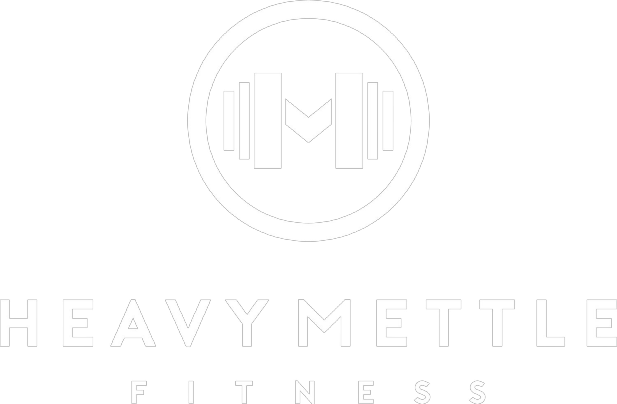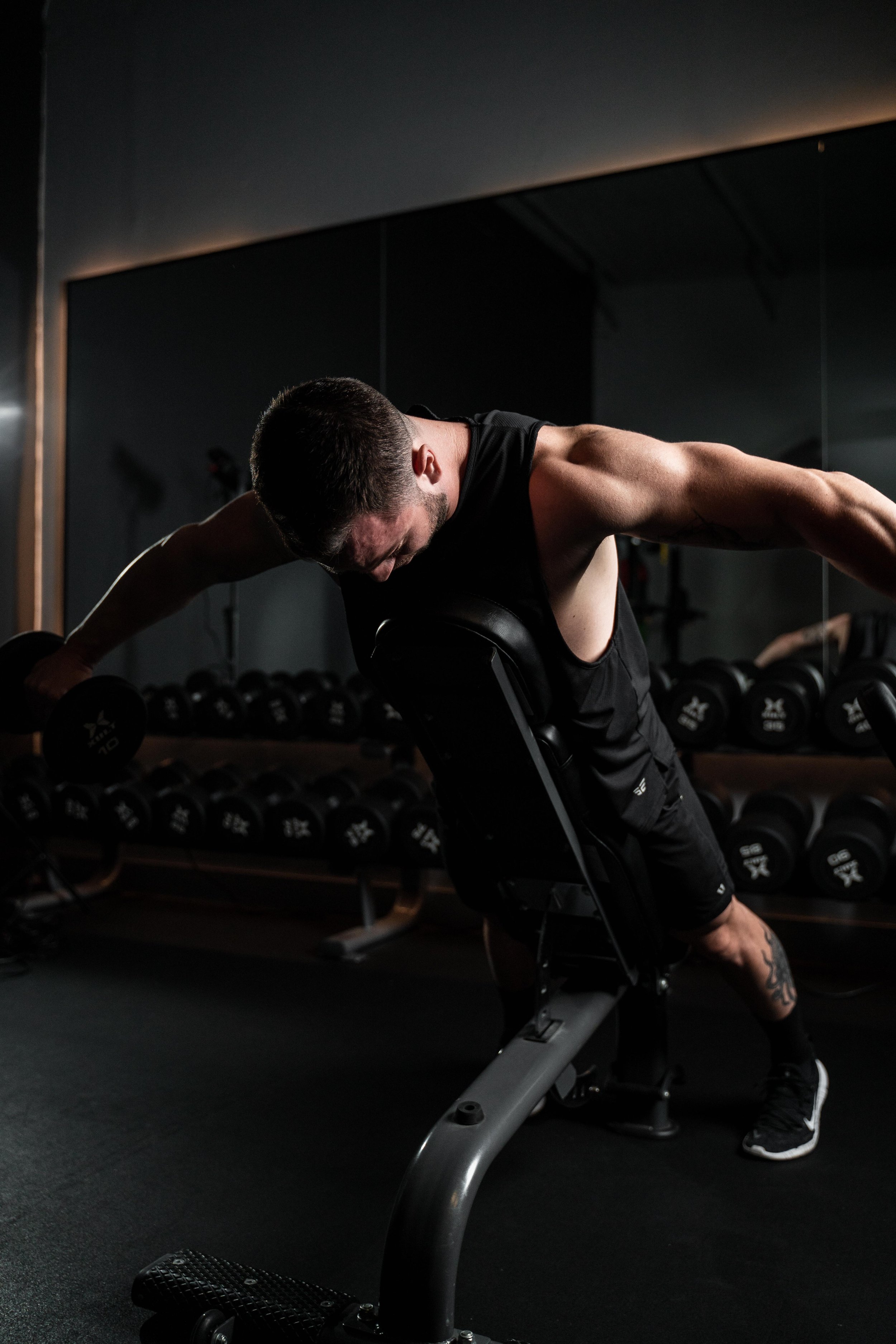A Personal Trainer's Top 5 Tips For Beginners
Are you ready to start your fitness journey and transform your health but unsure of where or how to start? I've been there too! The good news is that you won't have to make the same mistakes I made when I started my fitness journey. As a fitness professional and the owner of Heavy Mettle Fitness, I've compiled my top 5 tips for beginners from a personal trainer.
From setting realistic goals to finding the right workout routine and staying motivated, these expert tips will provide guidance from a personal trainer to kickstart your health and fitness transformation. Whether you aim to lose weight, build muscle, or improve your overall well-being, these tips will empower you to take that crucial first step towards a healthier, fitter version of yourself. As a certified personal trainer and former fitness newbie, I'll share the top tips I wish someone had shared with me when I first started in fitness!
Know Yourself
When starting a fitness journey, it's natural to get caught up in daydreaming about where you wish you were or where you want to be at the finish line. However, it's equally important to recognize where you are presently and set realistic expectations for yourself based on your abilities, health/injury history, and any previous exercise/athletic experience.
If you've never been in a weight room before, chances are you won't be able to walk up to a squat rack and start squatting 315lbs. You need to take the time to discover what your body can and can't tolerate. Start slow and be conservative with the weights you lift, and as your body acclimates to the new stimulus, you can gradually increase the weight from there.
A beginner should always start with lighter weight until they become comfortable with exercise technique and form.
Being overzealous or impatient and trying to lift weights beyond your abilities more often results in injury rather than progression. Injuries implicate time away from the gym and exercise, which means it will take even longer to achieve the goals you've set for yourself.
In addition to using appropriate weight, a novice should stick with beginner-friendly exercises. Some movements (exercises) will be more complicated than others as they involve multiple joints, require more core strength, or even require a greater degree of balance (Bulgarian split squats would be an example). Learning entry-level exercises can be challenging enough, and trying to learn new movements while needing to concentrate on multiple muscle groups makes things far more complex. Below are some examples of more advanced exercises and their simplified versions that you can try as a beginner.
Example One
Original: Barbell Front Squats
Beginner: Dumbbell Front Squats
Example Two
Original: Bulgarian Split Squats
Beginner: Stationary lunges
As a personal trainer, I've trained countless beginners who lacked considerable mobility in many areas of their body. As a newbie, it's important to identify and address any limitations with mobility before attempting heavier weights, as these limitations can be a prime environment for injuries to occur.
Focus on establishing the correct form and full range of motion. Prioritizing these elements of a given exercise will reduce the risk of injury and help build strong and healthy muscles and joints. Building a strong foundation will enable a novice to progress safely and consistently.
Stay Consistent With Your Training Routine
Consistency is the name of the game! When speaking with new clients, this is the concept I emphasize the most with them. Fitness is pretty simple; success in this field boils down to biology and physics. In a biology classroom, students observe that acute (short-term) and chronic (long-term) processes elicit different results. The same is true in the gym. While one training session may not produce many results, three to four sessions a week over the course of a month will likely produce more. Now, maintain that routine for a year, ten years, 20 years, etc. The results are going to be much more dramatic. So, it's critical that you're patient with yourself and allow yourself time to see the results you're working hard to achieve.
While inconsistency can hinder your results, it could also contribute to a beginner's discomfort in the weight room. Experienced gym-goers will tell you that the hardest phase is the beginning, and the routine becomes less difficult to complete as the body and mind adjust to a more active lifestyle. If someone is consistently flaky with their workouts, they'll either progress out of this beginner's phase much more slowly or remain stuck in it and struggle with the discomfort and fatigue habitually, never getting to the point where they enjoy working out.
Consistency is also a factor that influences one's mindset. Staying in a healthy routine, even in difficult times, makes it easier to maintain that routine. Falling out of a workout routine makes it more challenging to begin training again. Remember, a train becomes much harder to stop as it gains momentum; an active lifestyle is much the same.
Track Your Progress
There's a reason personal trainers like to track client progress: seeing tangible evidence of progression is very encouraging and can be an excellent motivational tool.
For someone focused on weight loss, a great way to track progress is by taking photos on a consistent basis. Since we frequently see ourselves in a mirror it can be difficult to notice results. Comparing photos taken over a more extended period can offer a different perspective and better highlight how much someone has progressed with their fitness and weight loss goals. Progress photos can be taken every week or even once a month, and it can be beneficial for beginners to compare photos that were taken at the beginning of their journey to photos taken at the six-month or one-year mark to validate that their effort is paying off!
Recording body measurements is another means of measuring progress, as "the numbers don't lie." While this method may require the help of a friend or workout partner, measurements can be taken every four to six weeks. Seeing numbers decrease or increase is an objective way of tracking progress and reassessing one's workout regimen based on the results.
Tracking and recording progress can be a great motivational boost for a fitness novice.
For a beginner who is focused on simply improving their strength and overall fitness, tracking the weights they're using during their workouts is a great way to track progress. This method also helps beginners with self-accountability and allows them to evaluate more accurately when it's appropriate to increase weight or load on specific exercises.
Seek Professional Guidance
There's no shame in asking for help, especially when it comes to your fitness and health. With an abundance of information online and much of it being contradictory, knowing where to begin your fitness and/or weight loss journey isn't always clear. Personal trainers bring a wealth of knowledge and expertise to the table, helping individuals develop a solid foundation and avoid common pitfalls.
If you’re a novice looking to achieve significant weight loss, check out our previous article about how a personal trainer can help you lose weight.
Seeking fitness guidance from a certified professional who can assess your individual needs and goals can provide the clarity and structure you need to get on the right track. Unlike most fitness articles, a personal trainer will listen to your goals, assess your current ability level, and consider your exercise history to design a customized training program. A trainer can also provide expert tips and personalized advice for beginners to help start a fitness journey on the right foot.
A personal trainer can offer expert advice and guidance to a beginner throughout their fitness journey.
Most beginners have difficulty establishing proper form and range of motion; a personal trainer can mitigate these concerns and provide appropriate guidance. As the lead trainer of Heavy Mettle Fitness, I've conducted countless consultations with new clients who explain that they've injured themselves in the past due to improper form with certain exercises. These injuries are often discouraging and can derail any fitness endeavor. Hiring a personal trainer as a beginner can ensure that you learn proper exercise techniques and reduce the risk of injury.
Discipline isn't a skill or trait that's acquired overnight, and one of the main challenges novices face is staying motivated during the beginning of a new workout and lifestyle regimen. A personal trainer offers an added layer of accountability and motivation to those who find themselves at this initial stage of their fitness journey. In addition to the financial committment that comes with hiring a trainer, having someone who's expecting you to show up is a great push to get to the gym and complete each workout.
In addition to adding efficiency to your fitness regimen, the advice and guidance of a certified personal trainer can help you feel more confident as you pursue your fitness goals. If you're currently working with a trainer who knows your personal history and ability level, ask them what their top tips might be for you!
Don't Neglect Recovery
Recovery is an often overlooked aspect of a healthy training regimen. After pushing through and enduring challenging workouts, allowing time for your body to repair and rejuvenate is essential for optimal results. During the recovery process, the body adapts to the stress placed on it through exercise; therefore, rest days allow your muscles to heal and grow. Incorporating active recovery techniques such as light stretching, yoga, or low-impact activities like swimming promotes blood flow and can aid recovery and reduce muscle soreness.
While it may seem counterintuitive at first, incorporating rest days into your weekly routine can also enhance your workouts. Allowing your muscles to recover in between workouts can enable you to use heavier weights and improve your overall performance during each training session, resulting in greater progress over time.
Nutrition also plays an essential role in recovery. Fueling your body with the proper nutrients is vital to supporting muscle repair and growth. Protein is particularly important, as it provides the necessary building blocks for muscle tissue repair. Additionally, staying adequately hydrated to replenish fluids lost during workouts and maintain overall bodily functions is also essential.
Lastly, don't underestimate the power of sleep. Quality sleep allows your body to recover and recharge, promoting muscle growth, cognitive function, and overall well-being. Creating a calming bedtime routine and ensuring a comfortable sleep environment can help optimize sleep quality. As a novice, remember that supporting your body's healing process is vital for long-term success.
Best Workout Tips For Beginners
By setting realistic personal goals, maintaining consistency, tracking progress, seeking professional guidance, and prioritizing recovery, beginners can lay a solid foundation for long-term success. These five tips emphasize the importance of a holistic approach to fitness by considering both physical and mental aspects. With dedication and perseverance, beginners can overcome obstacles, stay motivated, and achieve their desired results.
*Please note that you should always consult your doctor before beginning an exercise and/or nutrition regimen.






